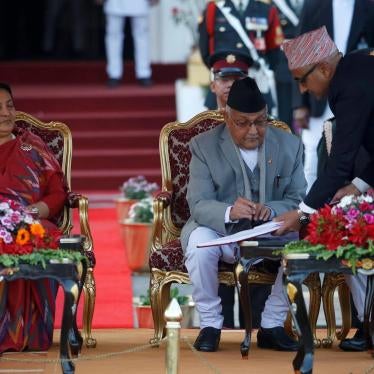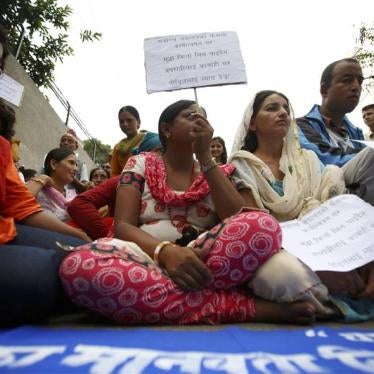Dear Prime Minister Oli,
On behalf of Human Rights Watch, I would like to extend my sincerest congratulations on your appointment as Prime Minister, following Nepal’s historic national and local level elections.
Human Rights Watch is an independent non-governmental organization that works in over 90 countries around the world, including the United States, India, and China. We have worked on human rights in Nepal for several decades, on issues ranging from war-time abuses by all sides of the conflict, LGBT rights, child marriage, and protection of people with disabilities.
As you assume leadership in Nepal, we are writing to seek your support on some key issues we hope your government will address as a priority. We also welcome promise of constitutional amendments that would help to enable provincial governments to redress historical abuses and neglect against traditionally disenfranchised groups.
Transitional Justice: The Truth and Reconciliation Commission (TRC) and the Commission of Investigation on Enforced Disappeared Persons (CIEDP) have been working over the last two years. Yet, almost 12 years since the end of the war victims have received no justice and no answers. The Supreme Court directives to ensure legislation that fulfils Nepal’s obligations under international law have been repeatedly ignored, leading to the current situation, where the United Nations and international community have abandoned all support for the programs. The new government has announced the attorney general will work to bring current laws into conformity with international law, which we hope will be done as soon as possible. However, there still needs to be proper investigations which will require cooperation of all parties to the conflict to identify and prosecute perpetrators. Providing evidence should not be left to the victims.
In addition, we are particularly concerned about the lack of outreach and interim relief to victims of sexual violence during the conflict. Although the Nepali government has acknowledged that sexual violence occurred during the conflict, it has until now, done little to redress these abuses.
Looking ahead, it is important to publicly acknowledge that perpetrators of abuses, irrespective of their political affiliation or military standing, will be held to account for violations of international humanitarian law. In May 2016, during your previous term in office, a 9-point agreement between coalition partners directed authorities to withdraw all war-time cases pending before the courts and provide blanket amnesty to the alleged perpetrators. We are deeply concerned that this agreement still stands, and urge you to immediately make clear that you no longer support a blanket amnesty for war-time perpetrators. To this end, we urge you to publicly instruct your Attorney General to allow war-time case pending before the courts to proceed.
Violence in the Terai: Violence flared up in the Terai region following sharp disagreements over the new constitution promulgated in September 2015. Human Rights Watch and other organizations found credible evidence of serious human rights abuses by government security forces deployed to curb the protests, as well as evidence of violent crime by some protestors. The violence led to a virtual shut-down of landlocked Nepal’s southern border with India, which created a serious shortage of basic goods.
The government, established an independent high-level commission of inquiry into the violence. But, while the commission submitted its report in December 2017, it is yet to have been made public. We urge you to make the report public and instruct the relevant authorities to act on the recommendations, including follow-up investigations and prosecutions.
Delays in Earthquake Relief: We remain concerned about the delays in relief to victims of the devastating April 2015 earthquake. Many of those affected are in some of the country’s most difficult terrain. Although international aid and assistance poured in, more than three years after the earthquake, most victims have been left without aid. As these victims brace themselves for a third monsoon without shelter, we urge you to deploy a rapid delivery of assistance.
Rights of Children: Nepal has been working towards ending child marriage but progress has been slow. Nepal has the third highest rate of child marriage in Asia, with 37 percent of girls marrying before 18 years, and 10 percent below 15 years. An estimated 11 percent of boys marry before the age of 15. Human Rights Watch’s interviews with victims of child marriage, the majority of whom were from Dalit or indigenous groups, revealed that government officers often turned a blind eye to child marriages. Lack of access to education, social pressures and dowry practices are key factors. Some children run away into so-called “love-marriages” in an effort to avoid forced marriages. Girls who marry early often bear children early. This leads to serious health implications, including a rise in infant mortality rates.
We are also concerned about the lack of access to education and other rights of disabled children, who have lower enrolment rates and higher dropouts than other children. The education ministry should be aided in its efforts to ameliorate the situation for disabled children, including by coordinating with various ministries and departments as we all as with bilateral and multilateral partners.
Safe Schools Declaration: With its May 5, 2011 declaration by the Council of Ministers that schools must be “Zones of Peace,” Nepal has been a leader on declaring that students, teachers, and schools must be off limits to armed groups, even during times of armed conflict. It would therefore be symbolically meaningful if Nepal were to endorse the Safe Schools Declaration, a political commitment to better protect students, educational staff, schools, and universities during armed conflict. It was drafted through a consultative process led by Norway and Argentina, and opened for countries to endorse in May 2015. As of March 2018, 73 countries—representing more than one third of all UN member states—have already endorsed the Safe Schools Declaration. If Nepal were to join this community of likeminded countries committed to protecting education, then Nepal could share its 2011 ministry of education guidelines on schools as zones of practice as an example of good practice for other countries to emulate.
Chaupadi: Although mostly dropped in urban areas, the practice of isolating menstruating girls and women to huts or darkened rooms persists in many parts of Nepal. The practice, banned by law over 10 years ago, continues with deaths announced each year as a result of smoke inhalation or snake bites. In 2017, the government imposed penalties on those practicing chaupadi. While the penalties are a good first step up, we hope you can instruct local authorities to better monitor the practice and enforce the law.
Impunity and Security Sector Reform: The failure to hold to account members of the security forces for conflict related violations has created an environment of impunity. We urge your government to initiate much needed security sector reform including by acting on concerns raised by the commission that investigated the recent violence in the Terai.
Gender and Sexual Minority Rights: Nepal has been at the vanguard of protection of the rights of gender and sexual minorities (also known as lesbian, gay, bisexual, transgender, and intersex—or LGBTI people) in South Asia. Since a 2007 Supreme Court judgment, the government has begun rolling out various rights-based measures, including by issuing third gender citizenship certificates and passports. Nonetheless, discrimination persists. The new criminal code, due to come into force in August 2018, contains several provisions that discriminate against LGBTI people, including a problematic mention of “unnatural sex,” with no definition, as a criminal offense. We urge you to continue to lead the effort in ending discrimination against LGBTI people.
Refugee Rights: Rivalry over Nepal’s diplomatic and military ties between Nepal and China heightened concerns over the rights of Tibetan refuges, especially in light of restrictions imposed on them in terms of their freedom of speech and assembly. Over the last few years, Nepal has imposed increased restrictions on Tibetans living in the country due to strong pressure from China. The government should make it clear to China that it will accept Tibetans who flee persecution as refugees, and will not restrict their rights to peaceful assembly, expression, and association.
Citizenship: Due to flawed citizenship laws, an estimated 4 million people are forced to live without citizenship and at risk of statelessness. Despite promises of reform, many people are unable to produce basic documentation to access their voting, education, government welfare, and other rights. The law makes it particularly difficult for women to access documentation, particularly when male family members refuse or are unavailable to do so. The citizenship laws in the constitution should be rectified to remove these restrictive hurdles.
Migrant Workers: An estimated 2 million Nepalis work abroad, although the numbers might be considerably higher given that many people migrate through unofficial channels. While there have been some reforms, they have done little to protect overseas migrant workers. We urge you to make protecting migrant workers, who account for nearly 30 percent of the country’s annual revenues, a priority by implementing and enforcing government initiatives aimed at reform and protection. This is particularly important in countries such as Qatar, where large numbers of migrant deaths are reported yearly due to inhumane working conditions.
Nepal now sits on the United Nations Human Rights Council as a voting member, and should uphold the highest standards of international law, both internally and towards member states who appear before the Council.
We look forward to working with your government on these issues.
Sincerely,
Brad Adams
Asia Director
Human Rights Watch








